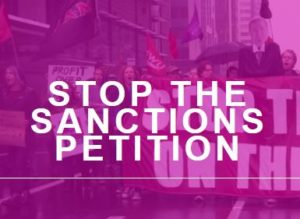Social Security Act Rewrite Bill
The Social Security Rewrite Bill has been reported back to Parliament by the Select Committee. The report is brief, just 11 pages long and makes few changes to the Bill. It includes minority reports from the Labour Party and Greens that point to the many issues raised by submitters that are not addressed in the Bill. It can be expected that there will be a lot of further debate when the Bill comes back into Parliament and there is still some opportunity for change.
Sanctions for not disclosing father of a child (Sections 176 – 178)
One specific area where NZCCSS,along with many other groups, is asking for further change is to the approach to sanctions in the Bill. In response to questions from the Select Committee hearing, NZCCSS talked with members of our networks about how to respond to the intent of the Bill and social security legislation generally and wrote to the Select Committee about this. The sanctions resulting from the similar clauses in current legislation affect 13,000 sole parent mothers and some 17,000 children by taking away $22 to $28 per week in income for non-disclosure of the child’s birth parent.
|
Take action by signing the online petition to Stop the Sanctions. |
Intent of the legislation
The intent of government in drafting this Bill we interpret as trying to hold fathers to account for their responsibilities towards children when they are not part of the household. This includes taking financial responsibility for child support.
The consensus of those working with children and families is that punitive measure against mothers for non-disclosure works against the children in those households. If the Select Committee supports the principle of putting the interests of the child at the centre then this takes priority over the issue of sanctions where children are concerned.
There are some good reasons why a person may want to get out of any relationship with the father and so they do not put his name forward. It is particularly important women are not pressured into having contact with or financially depending on someone whom they fear – emotionally or physically. Safety must outweigh expediency at every turn. Sanctions could actually result in the State promoting unsafe environments for women and children. Non-disclosure is most likely to avoid dealing with the father, rather than to protect the father. While exemptions are available under the current legislation, Work & Income does not adequately inform clients of their rights under legislation and clients are not made aware of this option.
A more helpful approach is to empower the mothers with a child to disengage from a potentially unsafe relationship and build a life for themselves and their child surrounded by a supportive network. The State needs to support constructive approaches that ensure women have access to support to address the family violence and other family issues. Agencies in the NZCCSS networks are very involved in such programmes and the strong message from their experience is that the most effective way to help families in this situation is to support them actively and positively.
Problems of child support system
The child support system is very problematic and some of the issues of non-disclosure relate to how poorly this system serves fathers that are alienated from their children. Many fathers do not see the money they pay as going directly to their children but rather to the government. Attention needs to be paid to constructive and safe ways for fathers to have the possibility of keeping their relationship alive with their children and taking some financial responsibility. The financial incentives and penalties in the benefit system and child support system work against this at present and discourage disclosure of the full circumstances. If the mother is on a benefit then the child support payments from the father are not paid to the child but retained by government. NZCCSS recommends that some of the child support can be paid directly to the mother (without affecting benefit) as is done in some other parts of the world.

